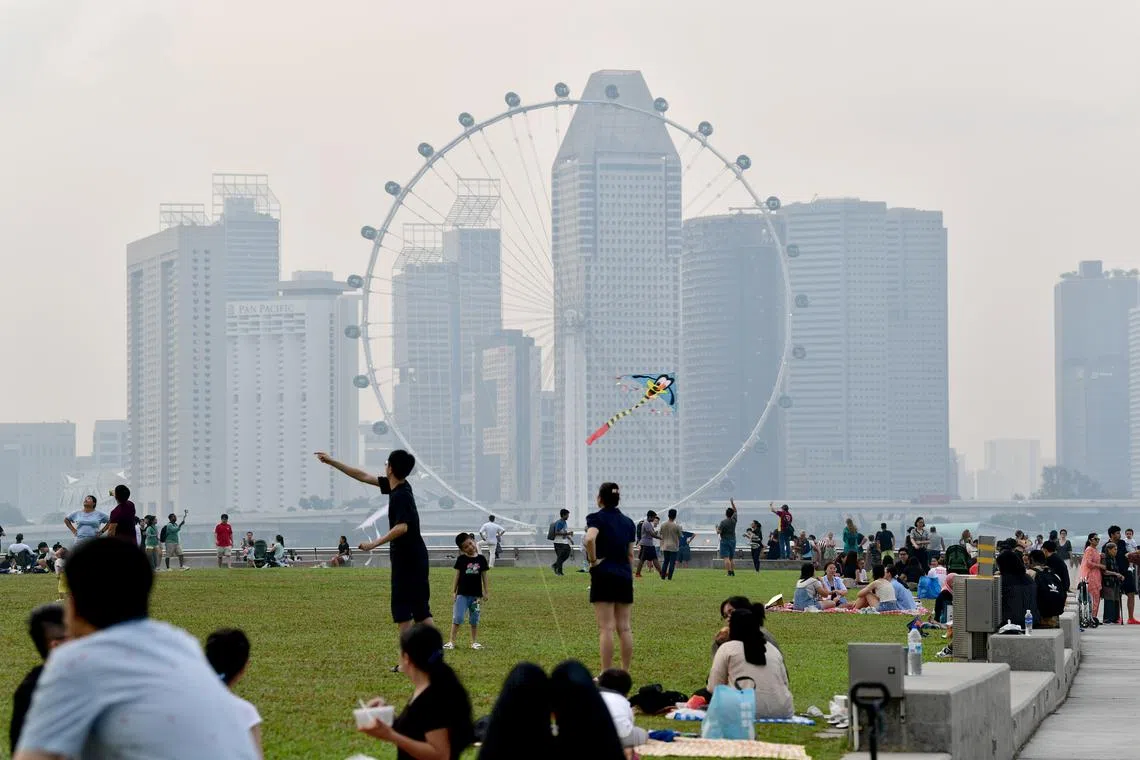More feel greater govt role in race, religion issues is needed: IPS survey
Sign up now: Get ST's newsletters delivered to your inbox

The survey was conducted from April to August in 2024 and involved a nationally representative sample of 4,000 Singapore residents.
PHOTO: ST FILE
SINGAPORE – More Singapore residents felt in 2024 that there should be greater government involvement in managing issues of race and religion, compared with six years ago.
An Institute of Policy Studies (IPS) report released on Feb 4
The IPS survey – conducted in 2024 – found that among those polled, race and religion were seen as the most volatile societal fault lines, with a greater potential to trigger unrest when compared with other issues.
The IPS paper, which presents findings on public perceptions of societal fault lines in Singapore and how they are managed, comes as Parliament on Feb 4 debated the Maintenance of Racial Harmony Bill
About 30.5 per cent of the respondents said there should be more government involvement in race issues, compared with 27.3 per cent in 2018. As for religious issues, 28.4 per cent of those polled felt government involvement was needed, compared with 23.2 per cent in 2018.
The 2024 survey, conducted from April to August, involved a nationally representative sample of 4,000 Singapore residents.
The findings build on data gathered in a 2018 survey, which had 4,015 respondents, and detailed public sentiment on five issues – race, religion, immigration, socio-economic status and LGBT issues.
Across the two surveys, two-thirds or so of the respondents – 63.3 per cent in 2024 and 65.7 per cent in 2018 – said there is sufficient government involvement in managing race issues, while less than one in 10 – 6.2 per cent in 2024 and 7 per cent in 2018 – preferred reduced involvement.
Similarly, for religious issues, about two-thirds of the respondents – 64.8 per cent in 2024 and 67.8 per cent in 2018 – preferred government involvement to remain at status quo, while less than one in 10 – 6.9 per cent in 2024 and 9 per cent in 2018 – wanted less government involvement.
The latest survey found that Chinese respondents were more likely to feel that the current level of government involvement with race issues should stay the same (66.9 per cent). Just over half of the Malay, Indian and Other respondents felt this way.
Older respondents, as well as those earning a higher income, were also more likely to say that the level of government involvement with race should remain the same.
Across the five issues in the 2024 survey, race and religion were perceived by the highest proportion of respondents to result in anger and violence against particular communities, if mismanaged.
The paper’s authors warned that while government intervention is widely accepted, an over-reliance on state-led management of racial and religious issues carries risks.
“Passive dependence on government initiatives may stifle grassroots efforts and community-driven approaches that are essential for long-term societal cohesion,” said researchers Mathew Matthews, Teo Kay Key, Melvin Tay and Rachyl Poh.
They added that strengthening bottom-up engagement and building a culture of collective responsibility would be key to building a resilient and inclusive society.
On government involvement in managing socio-economic class differences, immigration and LGBT issues, more were satisfied with the current levels of government involvement in 2024, compared with 2018.
For government involvement in managing socio-economic class differences, 56.4 per cent said there was a sufficient degree in 2024, compared with 48.7 per cent in 2018. Similarly, 55.4 per cent were satisfied with current government involvement in immigration issues in 2024, compared with 45.7 per cent in 2018; while 49.9 per cent said the authorities were sufficiently involved with LGBT issues in 2024, compared with 42.9 per cent in 2018.
Overall, the 2024 survey found that more than three-quarters of the respondents were satisfied with how race and religion issues have been handled in Singapore.
When these responses were broken down by indicators such as race, religion, age, education and income, it was found that respondents who were either Chinese, Taoist, older, lower-educated or of higher income were generally more likely to be satisfied with the Government’s handling of race and religion issues.
Of the 2.8 per cent of those polled who said they were either dissatisfied or very dissatisfied with how race and religion issues have been handled, most said they would consider having a conversation within their social networks – close friends, family members, classmates or colleagues – to improve the status quo.
In general, nearly six in 10 respondents indicated that current levels of public discussion on race and religion are sufficient, with marginal changes recorded between the 2024 and 2018 surveys.
As for public discussion on socio-economic status differences, immigration and LGBT issues, more were satisfied with levels of public discussion on these matters in 2024, compared with 2018.
More than half indicated they were satisfied with public discussion on socio-economic status differences and immigration compared with under half in 2018; while more than four in 10 indicated likewise for LGBT issues in 2024, compared with over one-third in 2018.
In both the 2018 and 2024 surveys, more than nine in 10 respondents agreed to some extent that the Government is responsible for racial and religious harmony in Singapore, and that it should help all racial and religious groups preserve and maintain their traditions and customs. Most also felt the Government has helped to improve racial and religious harmony and has treated people in Singapore fairly, regardless of race or religion.
On race-based policies, in the 2024 survey, 5.9 per cent of respondents wanted to remove the Chinese-Malay-Indian-Others framework that the Government uses to categorise people, while 44.9 per cent supported keeping it.
Meanwhile, 24.8 per cent of those polled wanted the framework expanded to be more inclusive, 1.6 per cent wanted its categories reduced, and 22.8 per cent were not sure if the framework should be kept, removed or changed.
In both 2018 and 2024, support for a racial mix in each housing estate was strong, with 93.2 per cent indicating they agreed with this to an extent in 2024, and 92 per cent indicating likewise in 2018.
The majority of respondents also agreed to an extent that it is important that immigration policy ensures that the racial make-up of the population is maintained (83.8 per cent in 2024) and that minorities are proportionally represented in Parliament at a level similar to their proportions in the population (84.8 per cent in 2024).
The researchers also said that younger people “are more likely to engage in online discourse, social media advocacy, and other forms of collective action to address issues of race and religion”.
They cited a hypothetical social media post capturing a taxi driver making racist comments to a passenger that respondents were asked about, and pointed out that younger people were more likely to find it acceptable to use online platforms to hold the driver accountable. This included taking actions such as sharing the post on their own accounts and criticising the driver, or starting an online petition calling for the driver to be fired.
For instance, 64.7 per cent of those aged 18 to 35 said it was acceptable to point out what the driver did wrong by leaving a comment on the social media post, compared with less than half of those in other age groups – 36 to 50, 51 to 65, and older than 65.
Noting that younger respondents were more open to online activism, and more likely to want more public discourse on socio-economic class differences and LGBT issues, the researchers said this reflects a desire to participate in shaping these issues. But a careful balance has to be struck to ensure that “diverse voices are acknowledged and empowered, while maintaining social stability and unity across different communities”, they said.



